Long-awaited MT-09-based sportsbike gets premium chassis updates but no big power gains for 890cc motor
Yamaha’s been trailing this for a while, and now we finally get to see it: the new 2025 R9 sportsbike. A new generation of upper middleweight performance machine for the late 2020s, with just over half the power of the litre sportsbike class, and more accessible pricing, plus the latest in aerodynamics, electronics and chassis kit.
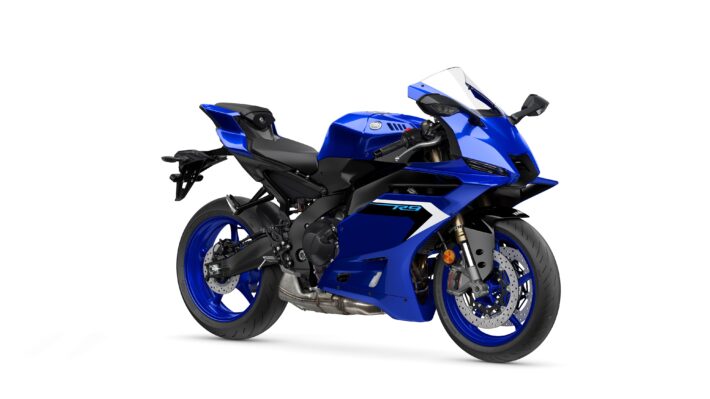
It’s based on the CP3 890cc engine from the MT-09 roadster and Tracer 900 (also seen on the XSR900 and Niken models), so it’s a well-established powertrain: inline-triple DOHC 12-valve with a bore and stroke of 78x62mm and 11.5:1 compression ratio.
There are minor mods to the fuelling, ignition and final drive ratios, but power is pretty much as you were: 117bhp peak, with a torquey delivery and flexible drive. Added to a wet weight of 195kg claimed though, and you have a bike with raw figures that would be middle-of-the-road on a 600 15 years ago.
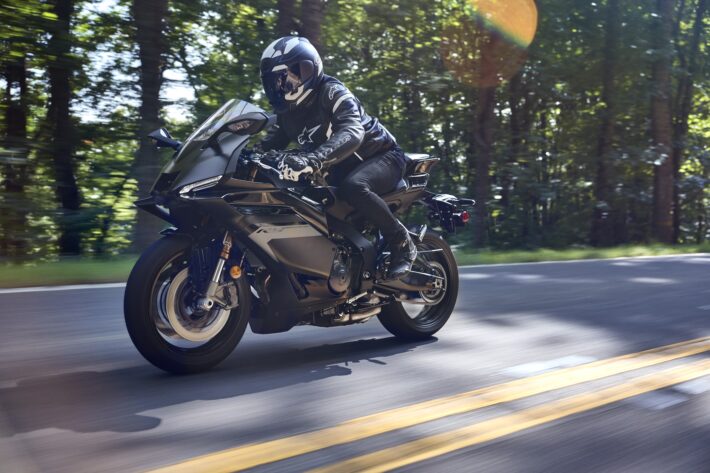
The chassis is more inspiring: Yamaha’s given the R9 its own bespoke frame design, with a gravity-cast aluminium Deltabox unit that weighs just 9.7kg, and has specially-developed stiffness for optimal handling. The suspension is by KYB, and Yamaha says it was developed alongside the new 2025 R1 Race model, with a new design of 43mm USD front fork.
This has separate damping circuits in each leg – rebound in the right and compression in the left, and is fully adjustable, as is the new KYB rear shock. The rear swingarm looks the same as the MT-09’s aluminium part, and since the press release doesn’t mention it, we guess it probably is the same as the MT-09’s aluminium part…
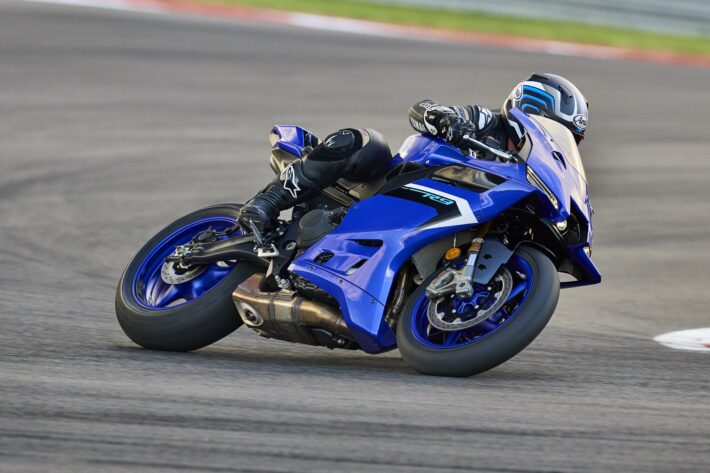
There’s a surprise in the stopping department though: Yamaha’s dropped the familiar Sumitomo-model brake calipers that it pioneered in blue-spot form way back in the mid-1990s on the Thunderace. These turned into gold spots, then silver spots, and were modified into radial designs, but have looked largely the same for nearly three decades now. A big step then to dump them for new Brembo Stylema performance calipers, alongside a Brembo master cylinder, and 320mm discs up front.
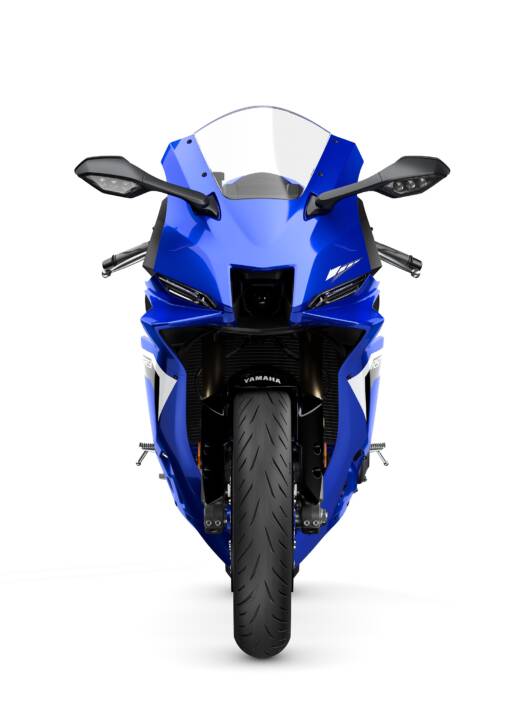
Away from the chassis, the R9 echoes the R-family lines with its full sports fairing, that looks much like the R7, R3 and R125 sister models – but Yamaha’s added some neat winglets on the top fairing. Arguably less important on a 117bhp bike than a 217bhp machine, they still improve stability at speed, reducing front wheel lift at speed by up to seven per cent according to the firm.
It also says there’s less drag than the old R6, despite the bigger engine and radiator. The bars are set quite low, but the riding position is apparently not too committed or sporty, with a stance in between the softer R7 and the R6 Race models. There’s also a 14 litre fuel tank, which is a bit less than we’d prefer if we’re honest (like most folk, we hate stopping to fill up…)
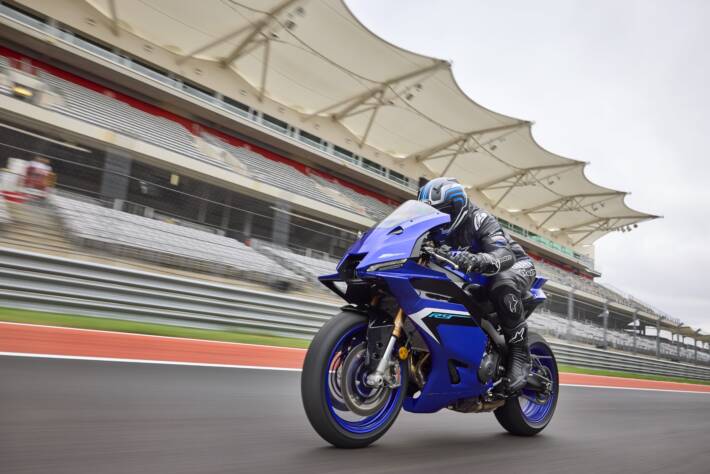
The final part of the R9 jigsaw is the electronics, and here there’s a proper setup, with just about everything you could ask for. On the performance front, you have lean-sensitive ABS with switchable rear channel, traction control, wheelie, slide, lift and engine brake control. Shell out for the optional Y-TRAC module and you can add on full datalogging of all the main bike parameters: speed, throttle percentage, revs, gear, lean angle, GPS position – and you also get a ‘virtual pit board’ function that lets your crew/mates in the pits text messages directly to your dashboard from their phones. There’s also a third-generation up/down quickshifter: nice.
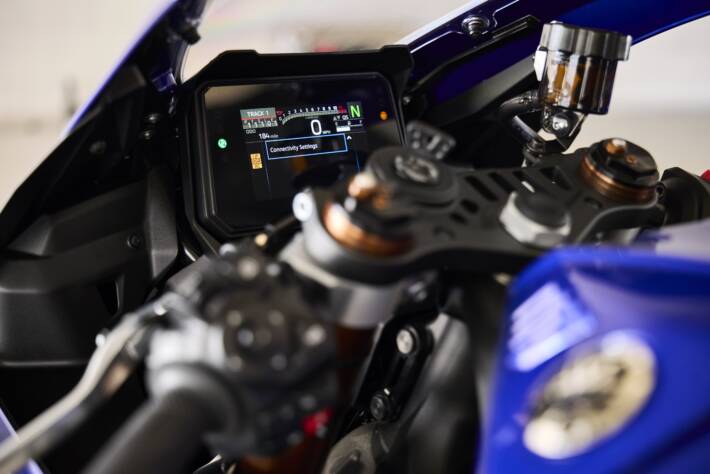
On the road side, you can add in cruise control, rider power modes and Bluetooth, and it’s all accessed via a bright new 5” full colour LCD dash with new switchgear.
So – a smart new sportsbike in the modern ‘not too crazy’ mould: how will it go down in the market? We reckon it will do well: the price is decent, it looks good, and will be a sensible option for road use. The committed trackday fan and club racer who must have the ultimate in track performance will obviously look elsewhere for a new or used R1 or R6. But for the more mainstream sporty rider, who wants a fun, lively, usable road bike, it definitely looks like a good option.
The 2025 Yamaha R9 will cost £12,250 and will be in UK dealers in March 2025. More info: www.yamaha-motor.eu
2025 YAMAHA R9 TECH HIGHLIGHTS
- 890cc CP3 liquid cooled 4-stroke DOHC, three-cylinder engine, 117bhp
- Lightest cast aluminium Deltabox frame on a Yamaha Supersport model (9.7kg)
- Brembo front master cylinder and Stylema calipers paired with 320mm brake discs
- New KYB 43mm front forks with Separate Damping Force design
- Fully adjustable latest generation KYB rear shock with remote preload adjuster
- 14 litre fuel tank
- Aggressive aerodynamic bodywork with downforce winglets
- New generation KYB fully adjustable 43mm front fork
- R1-developed 6-axis IMU
- Lean sensitive rider aids including Traction Control (TCS), Slide Control (SCS), Brake Control (BC) Power Modes (PWR), Launch control (LC), Lift Control (LIF)
- Third Generation Quick Shift System (QSS)
- Engine Brake Management (EBM) and Back-slip Regulator (BSR)
- Exclusive Track settings with rear ABS off mode and full YRC adjustability
- Yamaha Ride Control (YRC) with customisable settings
- CCU allowing uploading and downloading bike settings
- 5-inch full colour TFT display with connectivity features
- Log and analyse riding data with Y-TRAC
- Cruise control and Speed limiter
- Clip on handlebars
- Bridgestone Battlax Hypersport RS11 tyres
- Cast aluminium wheels
- Adjustable levers
- Forged aluminium gearshift pedal
- Optional Y-Trac function offers a ‘Virtual Pitboard’, where the rider’s pit crew can send messages to their dashboard while on track
